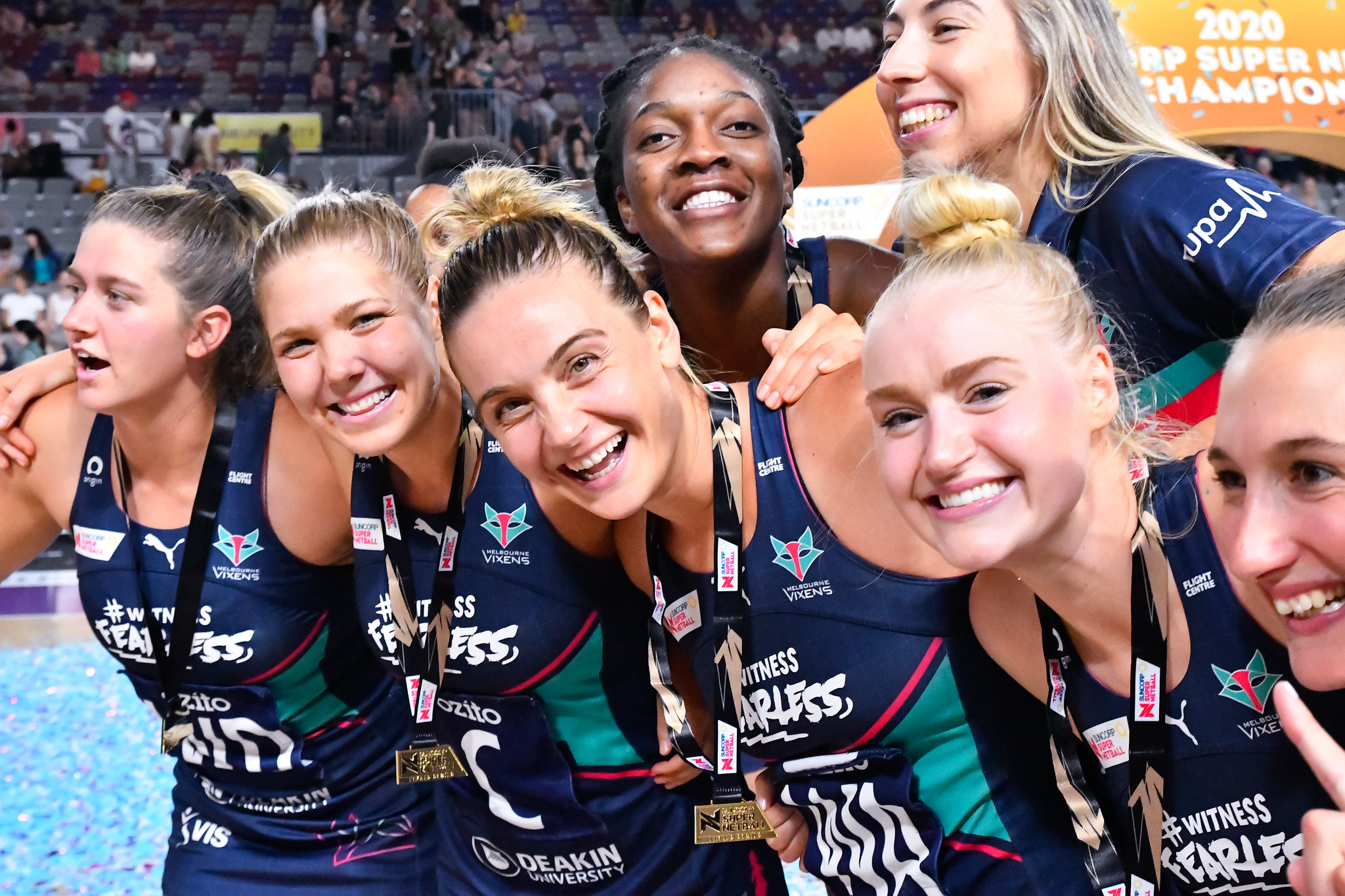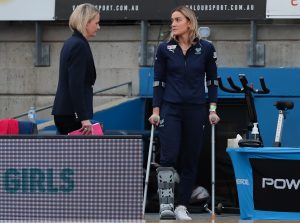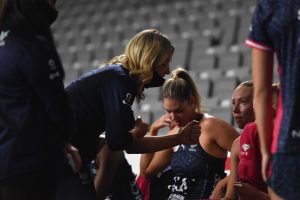
Liz Watson has learned some of her most valuable lessons at family gatherings. The importance of communication and strong relationships over lasagne at her Nonna’s table, building physical and mental toughness during backyard footy games, and a bird’s eye view of the competitive edge gained through sweaty pre-season trainings with her brother.
Combining that knowledge with 15 years worth of training and competition, has seen Watson develop into one of the most highly skilled athletes in the netball world, one who is rarely beaten and never stopped. An elite centre in her earlier years, Watson has more recently honed her craft at wing attack, proving to be a formidable weapon. A career Vixens player, she’s also represented Australia 48 times – three of them as captain – although recovery from surgery is keeping her off court for now.
Growing up in a close and sports mad clan, gatherings inevitably ended with kicking the Sherrin around. “Every family occasion was spent outside playing footy. I’m the only younger female on my mum’s side of the family, so had to mix it with my dad and uncles, cousins and brothers. They say they’ve made me tougher and more competitive – they take that credit,” she laughed.
Long summers tagging along with her AFL listed brother, were how Watson learned not just to endure, but to embrace, preseason training. “Matt would be doing home running programmes, and I would try to keep up with him. It taught me how hard you need to train, and the work you need to do away from the club and official training sessions, if you want to succeed. Training with someone also helps.
“Pre-season is now one of my favourite times, which is pretty crazy, but I learned to love it as well as understanding how important it is.”
A cross-code athlete when younger, Watson focused on netball after building strong friendships, working her way up the junior ranks and experiencing an injury that would later come back to haunt her.
The support of family and friends has always been important to Liz Watson, pictured after winning the Suncorp Super Netball grand final in 2020. Image Simon Leonard
She’d barely left her teenage years behind when both the Vixens and the national coach came calling. In 2014 Watson was preparing for a year in the Victorian State League, when Elissa Kent had to step back from the Vixens due to pregnancy. A late entry into the team, Watson said it was a ‘daunting’ way to start.
“I’d trained with them occasionally, but never consistently at that level, or done a pre-season with them. So while I was very excited at first, I soon realised how hard and intense it was.”
It was a Vixens’ era including players that Watson described as ‘superstars’ – Bianca Chatfield, Madi Browne, Geva Mentor and Cath Cox, but also the start of a long journey with fellow youngsters Kate Moloney and Jo Weston.
Watson reflected, “Bianca was the captain at the time, and she was so supportive. She brought out the best in all of us – we were all treated on the same level, and she reminded us that we had the responsibility of playing for Victoria and for the Vixens.
“She said we kept her young and fun, and she kept us in line! But our team was a good mix of experience and youth, and we won the premiership that year. Bianca is still a close friend and mentor to this day.”

Liz Watson has been the premier wing attack in the Suncorp Super Netball competition over a number of years, winning the Liz Ellis Diamond in 2018. Image Simon Leonard
Just a year after selling programmes at a Constellation Cup match, Watson was swept up in a whirlwind of success, also being named in the Diamonds’ squad.
“I didn’t know if I’d be getting a phone call from Lisa (Alexander, Diamonds’ head coach at the time). I remember Cath Cox, who was in the Vixens at the time, telling me that I’d be a great chance, but I didn’t think that at all. They just didn’t put first year players in the squad.
“But Lisa did ring. She said she was very impressed with my season, and believed I had potential. To be honest, while it was very exciting it was also a blur.”
It took Watson a couple of seasons to make her international debut, and in the meantime she worked hard on the selectors’ feedback. Having mainly played centre for the Vixens, she needed to develop her game at wing attack. “I had to become more agile and dynamic across two positions. At that time I didn’t have the short, sharp game that a wing attack needs.
“So I had to work on my agility, speed and power. To turn quickly, look down court, and be more dynamic.” The work paid off, and Watson was soon widely regarded as the world’s best attacking midcourter.
Making her national debut in 2016, Watson has been a fixture in the Diamonds’ 12 ever since, and is now one of the senior athletes in the team. She said, “When you first get to this level, everyone is so elite and focused, knows what they need to do to perform, and how to operate within the team. But as you get older, you have more off-court learnings – what it’s like to be on tour, the dynamics of the group, selection, missing selection, how the team runs.”
“It was devastating to have two one goal losses at the Commonwealth Games and Netball World Cup. We had clear projections for the team at the time, we wanted to peak at those events, and it was tough. But we have to keep going, keep fighting and pushing onto the next event or tour.”

Celebrating a win over New Zealand at the 2018 Commonwealth Games. Image Simon Leonard
While Watson may not have tasted the ultimate success at those pinnacle events, the Vixens took out the SSN championship in 2020. It had, said Watson, been a long time in the making. “We had been so close over the last few years, but couldn’t quite get there. This felt like the last shot with the current group of girls that we had. It was almost a relief, and we all took a deep breath – we finally did it.
“We had the belief in the group, it was more, how did we not do it the year before, and the year before that? But it’s a very competitive league.”
After a Covid enforced pause of internationals, Watson led the Diamonds for three of their four Constellation Cup matches in March. While some fans criticised Australia for not appointing a permanent captain at the time, Watson believed it was smart policy.
“We didn’t have much time together as a squad, and it had been a chaotic domestic season due to Covid.
“When I first came into the Diamonds’ squad, I didn’t know the leaders at all. And while Laura Geitz was an amazing captain and a great leader, I hadn’t had anything to do with her, or the opportunity to get to know her.
“We had a lot of new players coming in, so it was the smartest decision that we allowed them time get to know everyone and vice versa, to figure out what we want and who we want in that position, what structure we want, and to put together a picture and a plan for the next four years.
“We decided we wanted a leader in each section of the court, so in the Constellation Cup we had the captain, and whatever area she was in, we picked two around that. So for me, we also had someone in the shooting and defence ends, while CBass (who was captain in the first test) had a middie and a defender.
During her childhood years, Watson had absorbed her mother’s sayings, and said her leadership style is based on an old family favourite – ‘Actions speak louder than words.’
“I’m not really a loud, motivational, inspirational kind of person. I just try to go out and do my role. To perform and encourage others to do the same. To say that I captained Australia, put like that, sounds really big and special, and it was amazing.”

Liz Watson captained Australia for three of the last Constellation Cup test matches. Pictured here taking the ball despite a strong challenge from Claire Kersten in Test 2. Image Steve McLeod
Watson feels fortunate to have had a variety of world class coaches to mentor her – including Simone McKinnis, Lisa Alexander, Marg Caldow and Stacey Marinkovich. “I love it, because they all bring something a little bit different.
“As an athlete, one of my biggest fears is that my form will plateau, and I will just get through each season without improving. So having different coaches can spark something new in you. They might see something about the way that you play, what you can bring to a team, or individually, what you can work on. As players, we have to keep evolving.”
While the Diamonds have had limited time together over the past 18 months, Watson has seen little tweaks, and a number of similarities between the programmes overseen by Alexander and Marinkovich. “Stacey and Lisa both have a similar mindset – we have a squad mentality, and we have a clear vision for the Commonwealth Games and World Cup.
“At the last Constellation Cup we had a lot of new players with their first time in the green and gold, and we tried some new things for our game plan. While we wanted to win, you can’t expect it to happen all at once. So we will build towards those events, but we don’t have all the answers just yet.”
Unfortunately, Watson is currently recovering from foot surgery earlier this year, and having missed the entire 2021 domestic season, may not be on court for Australia for a little while longer.
As a teenager, she had a navicular (foot bone) stress fracture, and spent six weeks in a moon boot allowing it to heal. Since then preventative measures including orthotics, strapping, supportive sandshoes and regular podiatry follow-ups, have kept the problem largely at bay.
However, during the 2020 Suncorp Super Netball season, Watson badly sprained that ankle. “After a short break I continued to play, not really knowing what was going on, whether it was my navicular playing up, or just ongoing issues from the injury. Perhaps I was moving differently to protect my ankle, and that put a different strain on my navicular.”
The pain settled down, and Watson didn’t really notice it during the Constellation Cup. However once she started pre-season training it became obvious there was a bigger problem than she’d first thought.
“Simple things like single leg hops or calf raises were such an effort, and shouldn’t be. Running sessions didn’t feel great. I was waking up in the morning with a really stiff ankle, and it hurt when I’d walk after sitting still for a while. It just didn’t feel right.”

A sight no one wants to see – Liz Watson injured rather than out on court. Image May Bailey
An extensive consultation process followed, including the Vixens’ and Diamonds’ medical teams, and Watson’s specialist. Preferring to opt for a conservative approach where possible, on this occasion he said surgery was needed.
Watson explained, “He told me that the bone would never heal by itself. If we did nothing, the bone would die, my ankle would have to be fused, and I’d never be able to run again, let alone play netball at this level.
“I was really disappointed because initially I didn’t think I’d have to go down the path of surgery. But my options were very clear, and so the decision was easy in the end. I now have a bone graft and a few pins in there.”
Post surgical progress has been good so far, with Watson diligently carrying out her rehabilitation programme. It’s been a waiting game, but she is hoping to start running soon.
She laughed, “This year I’ve had to learn to be patient. I really hate doing rehab by myself – I love training and playing with the team, so to be doing something different is frustrating. But I know that this is just a moment in time that I need to let my body heal. I need to listen to that, and not rush the process. My foot needs time.”
Watson has continued to travel with the Vixens, and in the absence of their assistant coaches during the second half of the Covid impacted season, sat alongside Simone McKinnis on the bench. Watson’s role has included helping to plan trainings, communicate with players, and sharing the load. She said, “Simone is so passionate, loves the girls, and rides every pass.
“She’s given me an opportunity, put a lot of trust in me, and has asked about my thoughts and changes that we should make during the game.”
Observing from the sidelines has also given Watson a different tactical perspective. “I do need to get better at noticing things when I’m playing – seeing change-ups that are happening on court. That’s something I’ve definitely learned, and I hope that it can help take my game to a new level.”

Liz Watson on coaching duty in season 2021. Image Marcela Massey
Recently named in the Diamonds’ squad, but not yet fit to play, Watson is unsure what her role will look like at camp. She’s still keen to be around the group as much as she can, and will discuss how she can stay involved with the national coach.
For all the difficulties that Covid has presented in the past two seasons, it’s been a period of enormous personal growth for Watson. Together with supporting the Vixens, going through the loneliness of rehabilitation, and focusing on her studies as a primary school teacher, Watson has learned to slow down.
“I’ve realised how important it is to be patient, be present, and not rush around and get caught up in ‘Where am I going? What am I doing?’ – going from training to season to tour.
“There are so many other things happening, that it’s important to be able to step away mentally and physically from netball for a while. That’s another important lesson in life.”

Liz Watson on court for the Vixens in 2020. Image Simon Leonard

Liz Watson on court during Australia’s Commonwealth Games campaign, 2018. Image Marcela Massey
